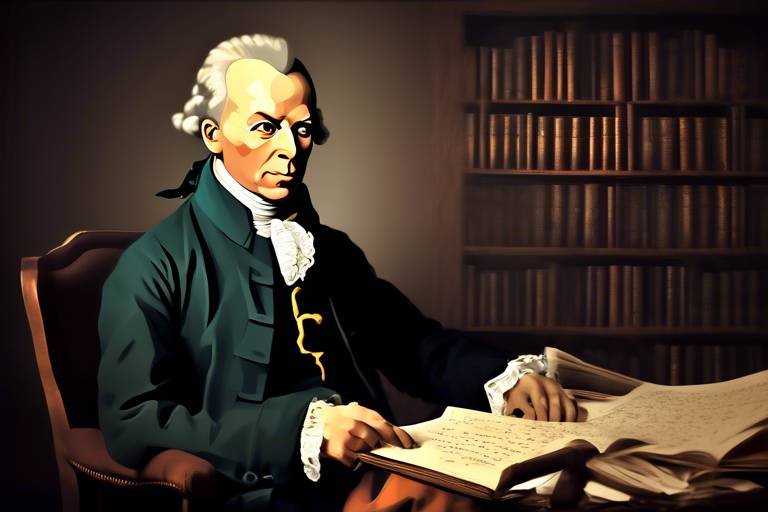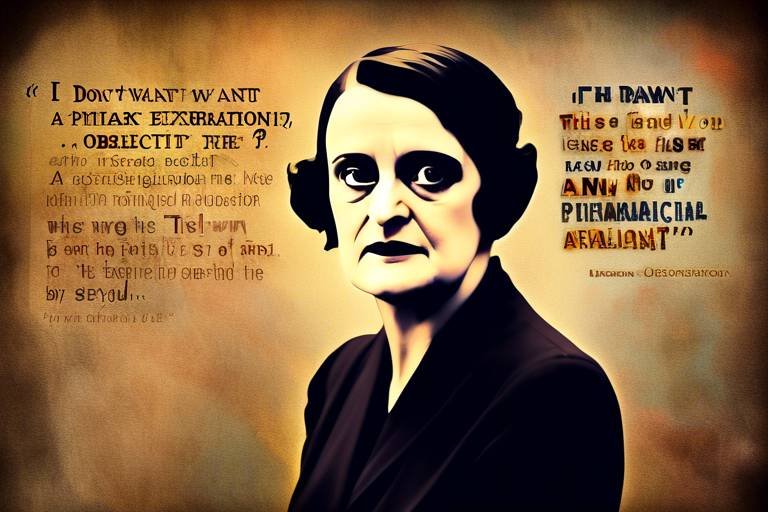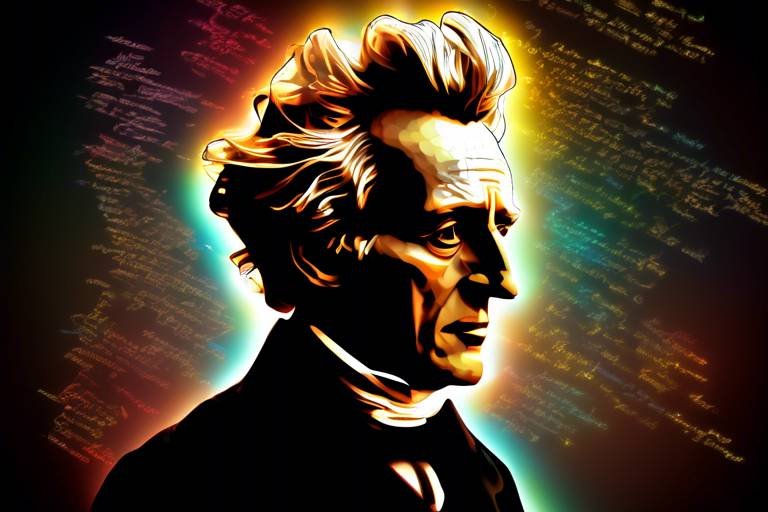Immanuel Kant: A Revolution in Moral Philosophy
Immanuel Kant, a name that resonates through the corridors of moral philosophy, revolutionized how we think about ethics and morality. Born in 1724 in Königsberg, Prussia, Kant's ideas emerged as a response to the tumultuous philosophical debates of his time. His work laid the groundwork for modern ethical thought, challenging us to reconsider our understanding of right and wrong. But what makes Kant's philosophy so compelling? It's not just the complexity of his ideas; it's the profound implications they have on our everyday lives.
At the heart of Kant's philosophy is the notion that morality is not merely about personal feelings or societal norms; rather, it is grounded in reason and universal principles. This perspective invites us to engage in a deeper reflection on our actions and their moral weight. Kant's revolutionary approach encourages us to think critically about our moral duties and responsibilities, urging us to act in ways that uphold the dignity of all individuals. In a world often clouded by relativism and subjective morality, Kant's ideas shine like a beacon, guiding us towards a more principled existence.
One of the most striking aspects of Kant's work is his ability to connect abstract ethical theories with practical implications. He challenges us to consider not just the outcomes of our actions, but the intentions behind them. This focus on intention is what sets his philosophy apart from others, such as utilitarianism, which often prioritizes the greatest good for the greatest number. Kant's insistence on moral law and duty prompts us to ask ourselves: Are we acting out of genuine moral obligation, or are we simply seeking to achieve a favorable outcome?
As we delve deeper into Kant's moral philosophy, we uncover layers of thought that have shaped contemporary discussions on ethics. His concepts of autonomy, duty, and the categorical imperative continue to influence debates on human rights, justice, and moral responsibility in today's society. Kant's insistence on the inherent worth of every individual compels us to advocate for equality and justice, making his ideas as relevant now as they were in the 18th century.
In summary, Immanuel Kant's contributions to moral philosophy represent a significant turning point in our understanding of ethics. His emphasis on reason, duty, and the dignity of individuals challenges us to rise above mere emotional responses to ethical dilemmas. As we navigate the complexities of modern moral issues, Kant's philosophy serves as a vital framework, urging us to reflect on our actions and their broader implications. So, the next time you face a moral decision, remember Kant's call to duty and reason—it might just lead you to a more ethical path.
- What is Kant's Categorical Imperative?
The Categorical Imperative is a central concept in Kant's moral philosophy, serving as a universal principle that guides ethical decision-making by emphasizing the need for actions to be applicable as universal laws.
- How does Kant define duty?
Kant defines duty as the necessity to act according to moral law, which is dictated by reason rather than personal desires or consequences.
- What is deontological ethics?
Deontological ethics, as proposed by Kant, focuses on the morality of actions based on adherence to duty and rules, rather than the consequences of those actions.
- How does Kant's philosophy influence modern ethics?
Kant's ideas have significantly shaped contemporary ethical discussions, particularly in areas like human rights and justice, by advocating for the inherent dignity of every individual.

Kant's Categorical Imperative
The Categorical Imperative stands as the cornerstone of Immanuel Kant's moral philosophy, offering a unique lens through which we can evaluate the morality of our actions. Unlike hypothetical imperatives, which depend on personal desires and specific situations, the Categorical Imperative is universal and unconditional. It demands that we act only according to that maxim whereby we can at the same time will that it should become a universal law. This principle is not just a theoretical construct; it serves as a practical guide for ethical decision-making in our daily lives.
Imagine you are faced with a moral dilemma. You might wonder, "Is it right to lie to protect someone's feelings?" Kant’s Categorical Imperative would prompt you to consider whether lying could be universally accepted as a moral law. If everyone lied whenever it suited them, trust would erode, and the very fabric of society would unravel. This thought experiment illustrates the power of Kant’s framework: it urges us to think beyond personal inclinations and consider the broader implications of our actions.
To further understand the Categorical Imperative, we can break it down into three key formulations:
- The Formula of Universal Law: Act only according to that maxim which you can, at the same time, will to become a universal law.
- The Formula of Humanity: Act in such a way that you treat humanity, whether in your own person or in the person of any other, always at the same time as an end and never merely as a means to an end.
- The Formula of Autonomy: Act only so that your will can regard itself at the same time as making universal law through its maxims.
These formulations work in tandem to create a robust framework for moral reasoning. The first formulation emphasizes the importance of universalizability, while the second highlights the inherent dignity of individuals. It reminds us that people should never be treated solely as tools for achieving our goals. The third formulation reinforces the idea of autonomy, asserting that moral agents must legislate their own laws based on rationality and mutual respect.
In practical terms, applying the Categorical Imperative can lead to profound insights about our ethical responsibilities. For instance, consider the issue of charity. One might argue that donating to charity is a good deed. However, using the Categorical Imperative, we must ask ourselves: "Can I will a world where everyone is obligated to donate to charity?" If the answer is yes, then the action aligns with Kantian ethics. If not, we need to reassess our motivations and the broader implications of our actions.
In conclusion, the Categorical Imperative is not merely an abstract philosophical concept; it serves as a practical tool for navigating the complexities of moral decision-making. By urging us to consider the universality of our actions and the dignity of all individuals, Kant's framework equips us with the necessary tools to engage in ethical reasoning that transcends personal bias and societal norms. This is what makes Kant's contribution to moral philosophy not only revolutionary but also profoundly relevant in today's world.

Kant's Concept of Duty
When we think about morality, one name that often pops up is Immanuel Kant. His concept of duty is not just a philosophical idea; it's a profound way of understanding what it means to act ethically. For Kant, duty is the cornerstone of moral behavior. He believed that true morality comes from a sense of obligation rather than personal desires or the desire for positive outcomes. Imagine you're at a crossroads: one path leads to personal gain while the other requires sacrifice for the greater good. Kant would argue that the right choice isn't about what benefits you but rather what your duty compels you to do.
Kant's view on duty is intricately tied to his idea of moral law. He posits that every rational being has an inherent understanding of moral duties, which he refers to as the "categorical imperative." This imperative serves as a universal principle that guides our actions. It asks us to consider: "What if everyone acted this way?" If the action can be universally applied without contradiction, then it is deemed moral. This framework is what sets Kant apart from other ethical theories that may prioritize outcomes over moral principles.
In Kant's world, the moral law is absolute. He argues that we have a duty to act according to this law, regardless of the consequences. This is where his philosophy can seem rigid. For example, consider a scenario where telling the truth could lead to harm. Kant would argue that the moral duty to tell the truth must prevail, even if the outcome is undesirable. This unwavering commitment to duty can be both admirable and challenging, as it demands a level of integrity that many might find difficult to uphold in real-life situations.
Furthermore, Kant emphasizes that our duties are not just obligations to others, but also to ourselves. He believed that by fulfilling our duties, we are exercising our autonomy and rationality. This self-governance is crucial because it empowers us to make moral decisions based on reason rather than impulse. Think of it as a moral compass that guides you through life’s complexities. By adhering to our duties, we not only uphold our own moral integrity but also contribute to a more ethical society.
To summarize, Kant's concept of duty is a profound exploration of what it means to be moral. It challenges us to rise above our personal inclinations and consider the broader implications of our actions. While it may seem inflexible at times, it ultimately provides a robust framework for understanding moral obligations. In a world filled with ethical dilemmas, Kant's emphasis on duty serves as a reminder that our actions should be guided by principles that respect the dignity of all individuals.
- What is Kant's definition of duty? Kant defines duty as the moral obligation to act in accordance with universal moral laws, independent of personal desires or consequences.
- How does Kant's concept of duty differ from consequentialism? Unlike consequentialism, which focuses on the outcomes of actions, Kant's philosophy prioritizes adherence to moral laws and duties.
- Can you give an example of Kant's concept of duty in action? A classic example is telling the truth; even if lying could lead to a better outcome, Kant would argue that the duty to be honest must prevail.

Deontological Ethics
Deontological ethics, as championed by Immanuel Kant, is a fascinating realm of moral philosophy that places a premium on the principle of duty over the consequences of actions. Imagine a world where the morality of your actions is determined not by what happens as a result, but by the intentions behind those actions. This is the essence of Kantian ethics. Kant argued that our moral obligations are dictated by a universal moral law, which he referred to as the Categorical Imperative. This imperative serves as a guiding star, helping individuals navigate the murky waters of ethical dilemmas.
At its core, deontological ethics is about adhering to rules and principles that are inherently right, regardless of the outcomes they may produce. For Kant, the moral worth of an action is rooted in its adherence to duty. This means that even if an action leads to a negative outcome, it can still be considered morally good if it was performed out of a sense of duty. Think of it like a soldier following orders in battle; even if the outcome is tragic, the soldier's commitment to their duty holds moral weight.
One of the most compelling aspects of Kant's deontological approach is its insistence on the universality of moral laws. Kant proposed that moral rules must be applicable to everyone, without exception. This leads to the idea that we should act only according to maxims that we would want to become universal laws. In other words, before you make a decision, ask yourself: "Would I want everyone to act this way?" If the answer is no, then that action is likely not morally permissible.
This framework creates a strong foundation for ethical decision-making, as it encourages individuals to consider the broader implications of their actions. However, it also raises some challenging questions. For instance, what happens when duties conflict? If one has a duty to tell the truth but also a duty to protect a friend from harm, how does one navigate such a situation? These dilemmas illustrate the complexities inherent in a strictly deontological approach.
Despite these challenges, Kant's deontological ethics has had a profound influence on modern moral philosophy. It invites us to reflect on our responsibilities and the importance of acting with integrity, even when faced with difficult choices. By focusing on duty and moral laws, Kant encourages a sense of moral clarity that can sometimes be lost in a world that often prioritizes outcomes over principles.
In summary, deontological ethics is not just about following rules; it’s about understanding the moral fabric that binds society together. It challenges us to rise above personal inclinations and think about the greater good. So the next time you find yourself at a moral crossroads, remember Kant’s teachings: the right action often lies in the commitment to duty, regardless of where the road may lead.
- What is the main principle of deontological ethics? Deontological ethics focuses on the morality of actions based on adherence to rules or duties, rather than the consequences of those actions.
- How does Kant's Categorical Imperative relate to deontological ethics? The Categorical Imperative is a central concept in Kant's deontological ethics, providing a framework for determining what actions are morally permissible based on their universality.
- Can deontological ethics accommodate conflicting duties? While deontological ethics emphasizes duty, it can struggle with situations where duties conflict, leading to complex moral dilemmas.
- Why is Kant's philosophy still relevant today? Kant's emphasis on duty and moral law continues to influence contemporary discussions on ethics, human rights, and justice.

Absolute Moral Obligations
Immanuel Kant's philosophy introduces the concept of , which are duties that must be followed without exception, regardless of the circumstances. This idea is a cornerstone of his ethical framework, emphasizing that certain actions are inherently right or wrong, independent of their consequences. Imagine standing at a crossroads where one path leads to personal gain and the other to moral integrity; Kant would argue that the right choice is not influenced by the potential outcomes but rather by the moral law itself.
Kant believed that these obligations stem from the categorical imperative, a principle that demands individuals act only according to that maxim which they can will to become a universal law. In simpler terms, if you wouldn't want everyone to act in a particular way, then you shouldn't act that way yourself. This approach creates a universal standard for evaluating our actions, ensuring that morality is not subjective but instead grounded in rationality and consistency.
To illustrate this concept further, consider the following examples of absolute moral obligations:
- Truthfulness: Lying is inherently wrong, regardless of the situation or potential benefits that may arise from it.
- Respect for Persons: Every individual deserves respect and should never be treated merely as a means to an end.
- Justice: One must act justly, ensuring fairness and equality in all dealings, regardless of personal bias or gain.
These obligations create a framework where moral actions are not contingent on personal feelings or societal norms. Instead, they demand a commitment to a higher ethical standard. Kant’s insistence on absolute duties challenges us to rise above our instincts and emotions, which can often cloud our judgment. It’s a call to be rational beings, capable of discerning right from wrong based on reason alone.
However, Kant's rigid stance on absolute moral obligations has sparked debates among philosophers and ethicists. Critics argue that such a strict adherence to duty can lead to morally questionable outcomes. For instance, if telling the truth could result in harm to an innocent person, should one still adhere to the obligation of truthfulness? This tension highlights the complexities of ethical decision-making and the challenges of applying Kantian ethics in real-world scenarios.
Ultimately, Kant's notion of absolute moral obligations serves as a guiding light in the often murky waters of ethics. It encourages us to reflect deeply on our actions and their implications, fostering a society where moral principles are upheld, and individuals are held accountable for their choices.
- What are absolute moral obligations? Absolute moral obligations are duties that must be followed without exception, based on Kant's ethical framework.
- How does Kant's categorical imperative relate to absolute obligations? The categorical imperative provides a universal standard for evaluating actions, emphasizing that one should only act according to maxims that can be universally applied.
- Can absolute moral obligations conflict with emotional considerations? Yes, critics argue that strict adherence to absolute obligations can sometimes lead to outcomes that conflict with emotional or situational factors in ethical decision-making.

Practical Reason
When we talk about in the context of Immanuel Kant's philosophy, we're diving into a fascinating realm where rationality meets morality. Kant believed that practical reason is the ability of individuals to determine their moral duties through rational thought. It's like having an internal compass that guides us in distinguishing right from wrong, not based on emotions or societal pressures, but through a structured, logical process. Imagine trying to navigate a dense forest without a map; practical reason serves as that essential guide, helping us find our way through the complexities of ethical dilemmas.
Kant argued that every rational being possesses the capability of practical reason, which enables them to act according to moral laws that they legislate for themselves. This is a powerful idea! It places the responsibility of ethical decision-making squarely on the shoulders of individuals, allowing them to engage in a process of self-reflection and critical thinking. In this way, practical reason is not just about following rules; it's about understanding the principles behind those rules. It's akin to being a chef who not only follows a recipe but also understands the science of cooking, enabling them to innovate and adapt as needed.
To illustrate this further, let’s consider some key aspects of Kant's notion of practical reason:
- Universalizability: Practical reason requires that the principles guiding our actions can be applied universally. If an action is deemed moral, it should be acceptable for everyone to perform it in similar circumstances.
- Respect for Persons: Kant emphasized that every individual has inherent worth. Practical reason compels us to treat others not merely as means to an end but as ends in themselves.
- Autonomy: The exercise of practical reason reflects our autonomy, allowing us to create our own moral laws while respecting the autonomy of others.
Moreover, Kant believed that practical reason is essential for moral deliberation. It empowers individuals to critically assess their motives and the implications of their actions. This is particularly relevant in modern society, where ethical dilemmas abound. For instance, consider the debate surrounding artificial intelligence and privacy. A person utilizing practical reason would weigh the consequences of their actions, considering not just the benefits of technological advancement but also the moral implications of infringing on individual privacy rights. In this light, practical reason becomes a vital tool for navigating the ethical landscape of contemporary issues.
In summary, Kant's concept of practical reason is a cornerstone of his moral philosophy. It encourages us to engage in thoughtful reflection about our actions and their broader implications. By fostering a sense of moral responsibility, practical reason not only enhances our understanding of ethics but also empowers us to act in accordance with our values, making it a timeless and invaluable aspect of human moral agency.
- What is the main idea behind Kant's practical reason?
Practical reason is the capacity of individuals to discern moral duties through rational thought, allowing them to legislate moral laws for themselves. - How does practical reason relate to autonomy?
Kant posits that practical reason is essential for autonomy, as it enables individuals to make independent moral decisions while respecting the autonomy of others. - Can practical reason be applied to modern ethical dilemmas?
Yes, practical reason is highly relevant in contemporary discussions on ethics, as it helps individuals critically assess the moral implications of their actions in complex situations.

Autonomy and Moral Agency
When we dive into the heart of Kant's philosophy, we stumble upon the fascinating concept of autonomy. But what does it really mean? At its core, autonomy is about being self-governing. It's the idea that individuals have the capacity to make their own choices and legislate their own moral laws. Imagine being the captain of your own ship, navigating through the turbulent waters of ethical dilemmas. Kant believed that true moral agency arises from this self-governance, empowering us to act not merely on whims or external pressures, but from a place of reason and duty.
Kant argues that autonomy is not just a personal trait; it’s a fundamental aspect of what it means to be human. He suggests that every person possesses intrinsic worth and dignity, which must be respected. This respect for autonomy translates into a moral obligation to treat others as ends in themselves, rather than as means to an end. In simpler terms, it’s like saying, "I won't use you to achieve my goals; you have your own goals, and I respect that." This perspective is revolutionary because it places the individual at the center of moral consideration.
Moreover, Kant’s emphasis on autonomy leads to a profound understanding of moral responsibility. When we act autonomously, we are not just following orders or societal norms; we are making choices based on rational thought and ethical principles. This is where the magic happens—our decisions become a reflection of our moral character. For Kant, the ability to choose rightly is what defines our humanity. It’s like being given a blank canvas and the freedom to paint your own masterpiece of morality, where every brushstroke represents a decision made with care and consideration.
However, the journey of autonomy is not without its challenges. In a world filled with external influences, from societal expectations to peer pressure, maintaining true autonomy can be daunting. Kant acknowledges this struggle, urging individuals to cultivate their moral reasoning skills. By doing so, we can rise above the noise and make decisions that align with our moral values. This process is akin to tuning a musical instrument; it takes practice and dedication to ensure that our moral compass is accurate and reliable.
In conclusion, Kant's vision of autonomy and moral agency invites us to reflect on our own lives. Are we acting out of genuine moral conviction, or are we simply going with the flow? By embracing our autonomy, we not only honor our own dignity but also that of others. This is the essence of Kantian ethics: a call to recognize our shared humanity and the moral responsibilities that come with it. So, let’s take the helm of our moral ships and navigate the complex waters of ethical decision-making with confidence and purpose.
- What is autonomy in Kant's philosophy?
Autonomy refers to the ability of individuals to govern themselves and make their own moral decisions based on reason rather than external influences.
- How does autonomy relate to moral agency?
Moral agency is the capacity to act according to moral principles, and autonomy is essential for this, as it empowers individuals to make ethical choices independently.
- Why is respect for autonomy important?
Respecting autonomy recognizes the inherent dignity of individuals, ensuring that they are treated as ends in themselves, not merely as tools for others' purposes.

Influence on Modern Ethics
Immanuel Kant's moral philosophy has left an indelible mark on the landscape of modern ethics, shaping how we perceive and engage with concepts of morality, justice, and human rights. His ideas have transcended the boundaries of time and culture, becoming foundational to contemporary ethical discussions. It’s fascinating to consider how Kant's thoughts, articulated in the 18th century, resonate with the moral dilemmas we face today. For instance, when grappling with issues like human rights and social justice, one can trace the lineage of these debates back to Kant’s insistence on the inherent dignity of individuals.
Kant's influence is particularly evident in the way modern ethicists approach moral reasoning. His emphasis on universal principles invites us to evaluate actions not just based on their outcomes but on whether they can be universally applied. This perspective has sparked a rich dialogue in ethical theory, prompting thinkers to explore how Kantian principles can address contemporary issues. For example, in discussions about environmental ethics, the question arises: can we formulate duties toward future generations based on Kant's ideas of duty and respect for persons?
Moreover, Kant's notion of autonomy has empowered individuals to view themselves as moral agents capable of making ethical decisions. This idea has been pivotal in movements advocating for personal rights and freedom. In a world where individuals often feel marginalized or powerless, Kant’s philosophy serves as a rallying cry, reminding us that we have the capacity to legislate our own moral laws. This has profound implications in fields such as bioethics and political philosophy, where the autonomy of individuals is frequently at stake.
However, Kant's influence is not without its challenges. Critics often argue that his rigid adherence to duty can lead to moral dilemmas where emotional and situational factors are disregarded. For instance, in cases where telling the truth could cause significant harm, Kant's categorical imperative might suggest that honesty is the only option, regardless of the consequences. This tension between duty and empathy continues to fuel debates in modern ethical discourse.
To illustrate the profound impact of Kant's philosophy on various ethical frameworks, consider the following table that summarizes key areas of influence:
| Area of Influence | Kantian Principle | Modern Application |
|---|---|---|
| Human Rights | Inherent dignity of individuals | Universal Declaration of Human Rights |
| Bioethics | Autonomy and informed consent | Medical ethics and patient rights |
| Social Justice | Moral duty to treat others as ends | Advocacy for marginalized communities |
In conclusion, Kant’s ethical theories continue to spark vibrant discussions and debates in modern ethics, challenging us to consider the implications of our moral choices. His emphasis on duty, autonomy, and the universality of moral laws serves as a compass, guiding us through the complex moral landscapes of contemporary life. As we navigate these challenges, Kant's legacy reminds us that ethics is not merely an academic exercise but a vital part of our shared human experience.
- What is Kant's Categorical Imperative?
The Categorical Imperative is a central concept in Kant's moral philosophy that states one should act only according to that maxim whereby you can, at the same time, will that it should become a universal law. - How does Kant's philosophy influence modern ethics?
Kant's emphasis on duty and autonomy has shaped contemporary discussions on human rights, bioethics, and social justice, encouraging a focus on universal moral principles. - What are some critiques of Kant's ethics?
Critics argue that Kant's rigid adherence to duty can overlook the importance of emotions and situational context in ethical decision-making.

Kantian Ethics in Practice
When we dive into the real world of ethics, Kantian principles offer a fascinating lens through which we can examine our moral dilemmas. Imagine you're faced with a situation where you must decide whether to tell a painful truth or spare someone's feelings with a lie. Here, Kant's philosophy shines a light on the importance of adhering to moral principles rather than weighing the potential emotional outcomes. He would argue that telling the truth is a duty, a categorical imperative that must be upheld, regardless of the consequences.
In practice, Kantian ethics encourages individuals to assess their actions based on whether they can be universalized. This means asking yourself: "What if everyone acted this way?" If the action can be universalized without contradiction, it aligns with Kant's moral law. For instance, if you consider stealing to be justifiable under certain circumstances, you must reflect on what would happen if everyone stole whenever they felt justified. The chaos that would ensue illustrates why such actions cannot be morally acceptable.
Moreover, Kant's ethics emphasize respect for individuals as ends in themselves, not merely as means to an end. This is crucial in various fields, including business ethics, healthcare, and law. For example, in a corporate setting, a Kantian approach would discourage exploiting workers for profit, emphasizing that every employee deserves respect and dignity. This principle can lead to more ethical business practices, which can ultimately foster a healthier work environment and promote long-term success.
Consider a healthcare professional faced with a tough decision: should they prioritize a patient in critical condition over another patient who is stable but in need of care? A Kantian perspective would prompt the healthcare worker to consider their duties and obligations to each patient, emphasizing the importance of treating both as individuals deserving of care and respect. This approach can lead to a more equitable distribution of healthcare resources, ensuring that every patient is valued equally.
However, applying Kantian ethics is not without its challenges. Critics argue that strict adherence to duty can sometimes lead to morally questionable outcomes. For instance, if telling the truth results in harm to an innocent person, should one still uphold that truth? This dilemma demonstrates the tension between absolute duties and the complexities of human emotions and relationships. Yet, it is precisely this tension that makes Kantian ethics a rich field for exploration and discussion.
In summary, Kantian ethics in practice pushes us to reflect deeply on our moral choices. By prioritizing duty and respect for individuals, we can navigate ethical challenges with a clearer understanding of our obligations. This framework not only enriches our personal moral compass but also has the potential to transform societal norms, promoting a culture of respect and ethical integrity.
- What is the Categorical Imperative? The Categorical Imperative is a central concept in Kant's moral philosophy, which states that one should act only according to that maxim which they can will to become a universal law.
- How does Kantian ethics apply to modern dilemmas? Kantian ethics provides a framework for evaluating moral dilemmas by emphasizing duty and the intrinsic value of individuals, encouraging principled decision-making.
- What are the criticisms of Kantian ethics? Critics often point out that Kant's rigid adherence to duty can overlook the complexities of human emotions and the situational aspects of ethical decision-making.

Critiques of Kant's Philosophy
While Immanuel Kant's moral philosophy has undeniably revolutionized ethical thought, it has not escaped criticism. Some philosophers argue that Kant's ideas are too rigid, lacking the flexibility needed to address the complexities of real-life moral dilemmas. For instance, his strict adherence to the Categorical Imperative can lead to conclusions that seem counterintuitive or even morally questionable. Imagine a scenario where telling a lie could save a life; Kant's philosophy would insist on telling the truth, as lying cannot be universalized without contradiction. This rigidity can make Kant's ethical framework appear impractical in the face of urgent human needs.
Furthermore, critics point out that Kant's focus on duty often overlooks the emotional and situational factors that influence moral decisions. Emotions play a significant role in how we perceive right and wrong. In many cases, our feelings can guide us toward more compassionate and humane choices. For Kant, however, the moral law is paramount, and any decision made based on emotional inclinations could be deemed unethical. This raises the question: can we truly separate our emotions from our moral reasoning without losing something essential about our humanity?
Another significant critique revolves around Kant's concept of autonomy. While he champions the idea of individuals as moral agents capable of legislating their own moral laws, some argue that this perspective can be overly individualistic. In a world where social contexts and relationships deeply influence our moral choices, Kant's focus on individual autonomy may neglect the interconnectedness of human experiences. For instance, how do we reconcile personal moral laws with the collective moral standards of a community? This tension highlights a potential shortfall in Kant's philosophy, as it may not adequately address the complexities of social ethics.
Moreover, the absolute nature of Kant's moral obligations has led to debates about moral absolutism versus moral relativism. Critics argue that the idea of universal moral laws can be problematic when faced with cultural differences and varying ethical beliefs. For example, what is considered morally acceptable in one culture may not hold the same weight in another. This raises an important question: can there truly be a one-size-fits-all approach to ethics? The challenge lies in balancing universal principles with the rich tapestry of diverse human experiences.
In summary, while Kant's contributions to moral philosophy are monumental, they are not without their flaws. The critiques of his philosophy serve as a reminder that ethics is a dynamic field, constantly evolving to meet the needs of society. To fully appreciate Kant's legacy, one must also engage with the criticisms that challenge his ideas, fostering a richer dialogue about the nature of morality.
- What is the Categorical Imperative?
The Categorical Imperative is a central concept in Kant's moral philosophy, serving as a universal principle that dictates how one should act based on whether the action can be universally applied.
- Why is duty important in Kant's ethics?
Kant emphasizes duty as the foundation of moral action, arguing that ethical behavior should arise from a commitment to moral law rather than personal feelings or outcomes.
- What are the main critiques of Kant's philosophy?
Critiques include its rigidity, the neglect of emotional factors in moral decision-making, the potential overemphasis on individual autonomy, and challenges to the idea of absolute moral obligations.
Frequently Asked Questions
- What is the Categorical Imperative?
The Categorical Imperative is a central concept in Immanuel Kant's moral philosophy. It serves as a universal principle that guides ethical decision-making by requiring individuals to act only according to maxims that can be universally applied. In simpler terms, it's about asking yourself if your action could be a rule for everyone to follow.
- How does Kant define duty?
Kant emphasizes that duty is the cornerstone of ethical behavior. He believes that moral actions stem from a commitment to moral law rather than personal feelings or the consequences of those actions. Essentially, it's about doing the right thing because it is the right thing to do, not just because it benefits you.
- What does deontological ethics mean?
Deontological ethics, as championed by Kant, focuses on the inherent morality of actions themselves rather than their outcomes. This means that some actions are deemed right or wrong based on their adherence to rules or duties, regardless of the consequences that may arise from them.
- What are absolute moral obligations?
Kant argues that there are certain moral obligations that are absolute and must be followed without exception. This idea establishes a foundation for an objective moral framework, suggesting that some ethical principles hold true in all situations, regardless of personal or societal circumstances.
- How does practical reason play a role in Kant's philosophy?
Kant's concept of practical reason highlights our ability to discern and act upon moral duties. It underscores the importance of rationality in ethical decision-making, suggesting that individuals must use their reasoning capabilities to navigate moral dilemmas and determine their obligations.
- What is the significance of autonomy in Kant's ethics?
Autonomy is crucial in Kant's moral philosophy as it empowers individuals to legislate moral laws for themselves. This means that true moral agency comes from the ability to make independent choices while also respecting the autonomy of others, fostering a mutual recognition of moral rights and responsibilities.
- How has Kant's philosophy influenced modern ethics?
Kant's moral philosophy has profoundly shaped contemporary ethical discussions, particularly in areas like human rights, justice, and moral responsibility. His ideas challenge us to consider the principles behind our actions and their implications for society, making his work relevant in today's ethical debates.
- What are some critiques of Kant's moral philosophy?
Despite its significant impact, Kant's philosophy faces critiques for its perceived rigidity. Critics argue that it may overlook the emotional and situational aspects of ethical decision-making, suggesting that a more flexible approach could better accommodate the complexities of real-life moral dilemmas.



















